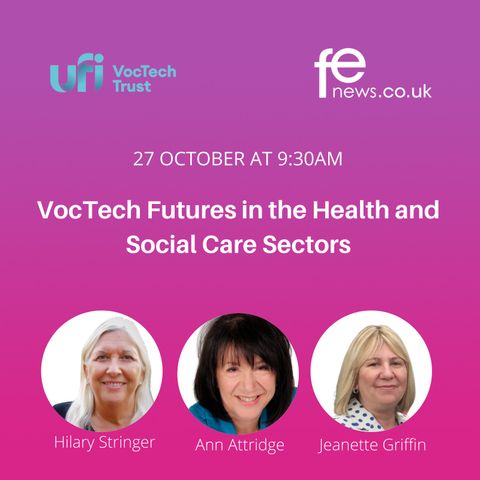VocTech in the Health and Social Care Sectors #VocTechFutures Episode 4

Descarga y escucha en cualquier lugar
Descarga tus episodios favoritos y disfrútalos, ¡dondequiera que estés! Regístrate o inicia sesión ahora para acceder a la escucha sin conexión.
Descripción
Ufi has funded a number of very exciting Health and Social Care projects over the last five years. Learners in this sector very often fit within our definition of ‘unloved’...
mostra másPandemic Response
During our VocTech Now pandemic response, Ufi funded several organisations to transform their delivery so that front-line workers could continue to access the training they needed to be competent and safe in the workplace and to deliver the all-important care services in those difficult times of early lockdown.
St Monica Trust, CTC (who ended up collaborating with one of our early projects in this sector, CuppaCare), Acorn Training, 3 Spirit (who have gone on to an Ignite project to explore AI in care), Acorn Training and Action for People all took the challenge of integrating VocTech into their practice so that learners could engage remotely in skills development. Responses included the creation of new resources that could meet both learner needs in being accessible for those with limited language skills, but still meeting the requirements of the accrediting body, right through to the kitting out of professional recording studios for the long-term creation of engaging learning content, demonstrating practical skills in a safe environment. There was a strong focus on allowing the seasoned professionals offering the training an effective way to deliver both skills and know-how using technologies that they were unfamiliar with. The learning curve was steep for both trainers and learners in many cases.
Several of our Seed and Impact projects have also tackled aspects of vocational training in this sector. The Spotless project by Solutions 42 uses scenario-based learning, contextualized to the learner’s environment, to help learners really understand compliance issues in care homes and hospital settings. AgyliaCare offers bite-sized training and an extensive catalogue of training, using AI to personalize the delivery of the content, for paid and unpaid carers.
What’s the challenge?
The big issues in this sector are around creating bridges and ladders so that people can join and progress within the care professions from diverse backgrounds. This can mean improving entry routes into the labour market for young people, ensuring the existing workforce has the skills businesses and the NHS need to deliver high quality care, supporting individuals to progress in their professional practice, and deploying those skills in a way that drives productivity and growth. In an industry where profit and operating margins are often very low, the challenge is to support training that goes beyond basic compliance and ‘box ticking’ to something that really engages learners and offers a valuable learning experience at a time place that they are able to access the content.
Demonstrator Projects
The two projects joining Hilary Stringer for this livestream are Passport to Employment in Health Care from City of Glasgow College/KLIK2LEARN, which provides innovative training for non-native English speaking healthcare professionals, and Future Dom Care (now called e-care) from Barking and Dagenham College where learners are empowered to gain new skills in their profession rather than having to leave the frontline of care to progress in their careers - previously featured on FE News in this article.
As of March 2020 there was an estimated 43,000 shortfall in nurses across the UK. Some of these positions could be filled by qualified professional from overseas or qualified immigrant healthcare professionals living in the UK. The aim of this City of Glasgow digital vocational training course is to provide non-native English speaking healthcare professionals with engaging, flexible and high-quality training which will enable them to obtain the language and skills needed to pass the mandatory Occupational English Test (OET) and start employment within the health service. The solution will enable them to improve their spoken and listening skills in authentic scenarios in real time. This project will give learners the option to study online, using an innovative tools and software, to create a user journey which focuses on communication skills and maps to the learning outcomes required to pass the OET. Building on the Ufi supported KLIK2LEARN platform, learners can study at their own pace, either using the tools and technology to guide them on the learning pathway or via a Tutor Supported option which will offer a blended approach.
Over the last twenty years, recipients of social care have become older and sicker. Homecare agencies and care homes are dealing with tougher, more complex challenges. At times, society has looked the other way. But something more positive has also happened. Digital innovation has seen diagnostic tools become smaller, cheaper and easier to use. The e-Care project from Barking & Dagenham College and Care City aims to give domiciliary carers some of the latest digital technology to spot ill-health quicker, so they can call the right clinician at the right time with the right information. e-Care are building a mobile learning platform to help carers – many of whom lack the time and resources to go to college for long periods – to learn about physiology, the latest care tech and about working with District Nurses and GPs.
KLIK2LEARN’s Ann Attridge and Jeanette Griffin from Barking and Dagenham will join us live to share more of their experiences.
Información
| Autor | FE News |
| Organización | FE News |
| Página web | - |
| Etiquetas |
Copyright 2024 - Spreaker Inc. an iHeartMedia Company

Comentarios